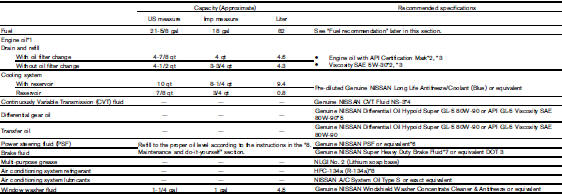Capacities and recommended fuel/lubricants
The following are approximate capacities. The actual refill capacities may be a little different. When refilling, follow the procedure instructed in the “8. Maintenance and do-it-yourself” section to determine the proper refill capacity.

1: For additional information, see “Engine oil” in the “8. Maintenance and
do-it-yourself” section for changing engine oil.
2: For additional information, see “Engine oil and oil filter recommendation”
later in this section.
3: NISSAN recommends Genuine NISSAN Ester Engine Oil available at a NISSAN
dealer.
4: Use only Genuine NISSAN CVT Fluid NS-3. Using transmission fluid other
than Genuine NISSAN CVT Fluid NS-3 will damage the CVT, which is not covered by
the NISSAN new vehicle
limited warranty.
5: For hot climates, viscosity SAE 90 is suitable for ambient temperatures above
328F (08C).
6: DEXRONTM VI type ATF may also be used.
7: Available in mainland U.S.A. through a NISSAN dealer.
8: For additional information, see “Vehicle identification” later in this
section for air conditioner specification label.
- Fuel recommendation
- Engine oil and oil filter recommendation
- Air conditioning system refrigerant and lubricant recommendations
See also:
Difference between predictive and actual distances
Backing up on a steep uphill
When backing up the vehicle up a hill, the distance
guide lines and the vehicle width guide
lines are shown closer than the actual distance.
For example, the displ ...
Map pockets
Front Console ...
Instrument brightness control
Push the “+” button A to increase the brightness
of instrument panel lights when driving at
night.
Push the “-” button B to decrease the brightness
of instrument panel lights when driv ...
